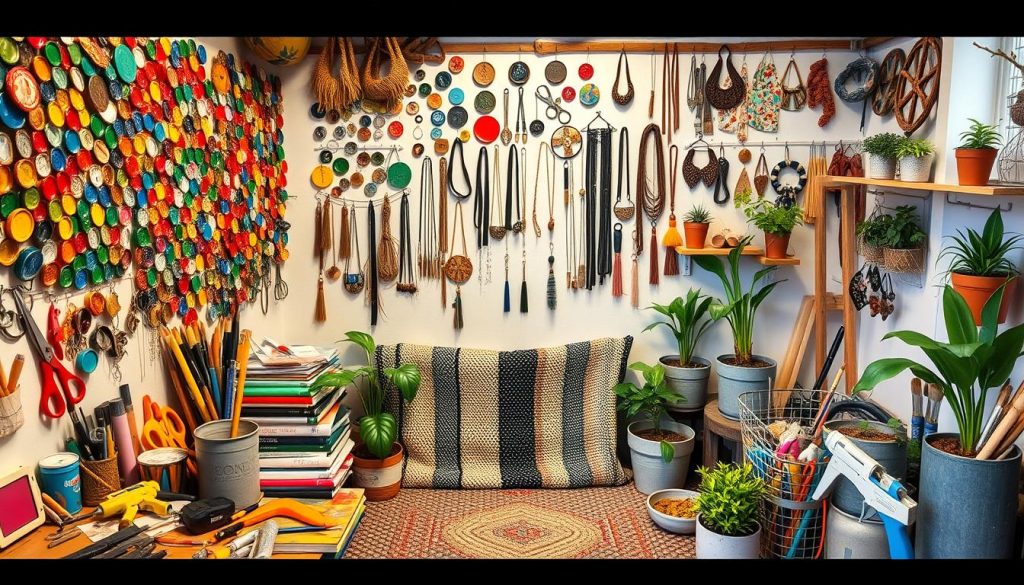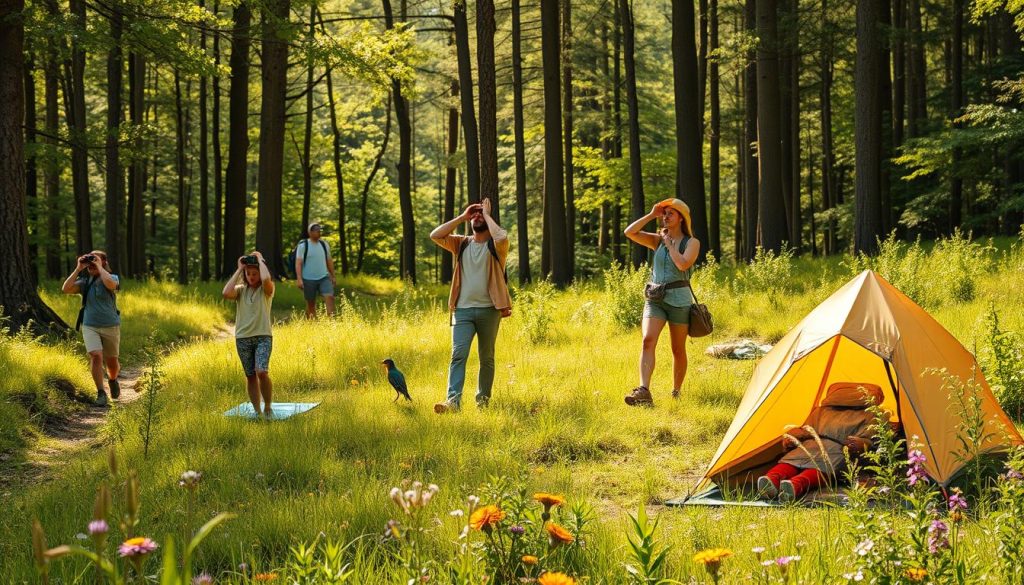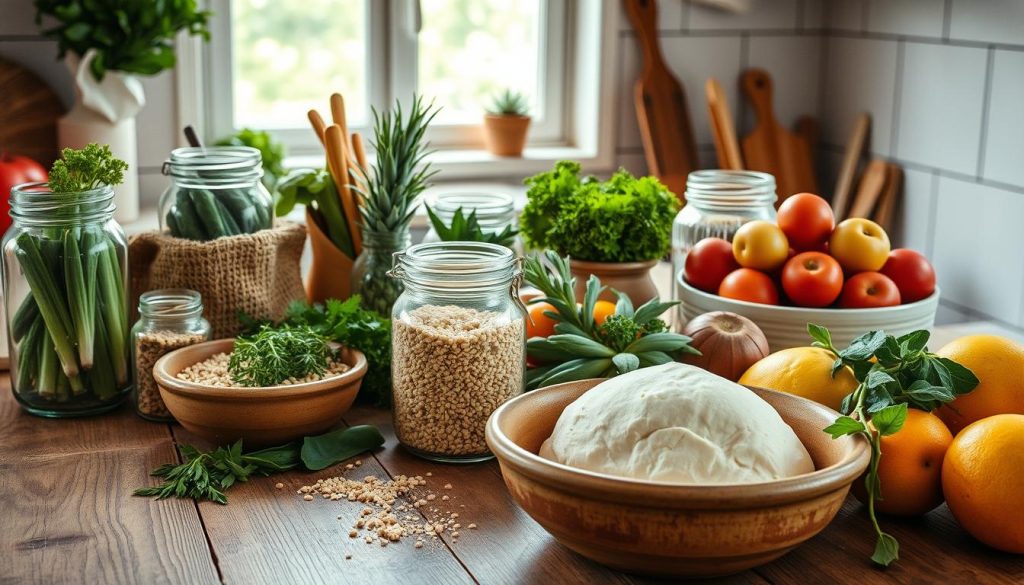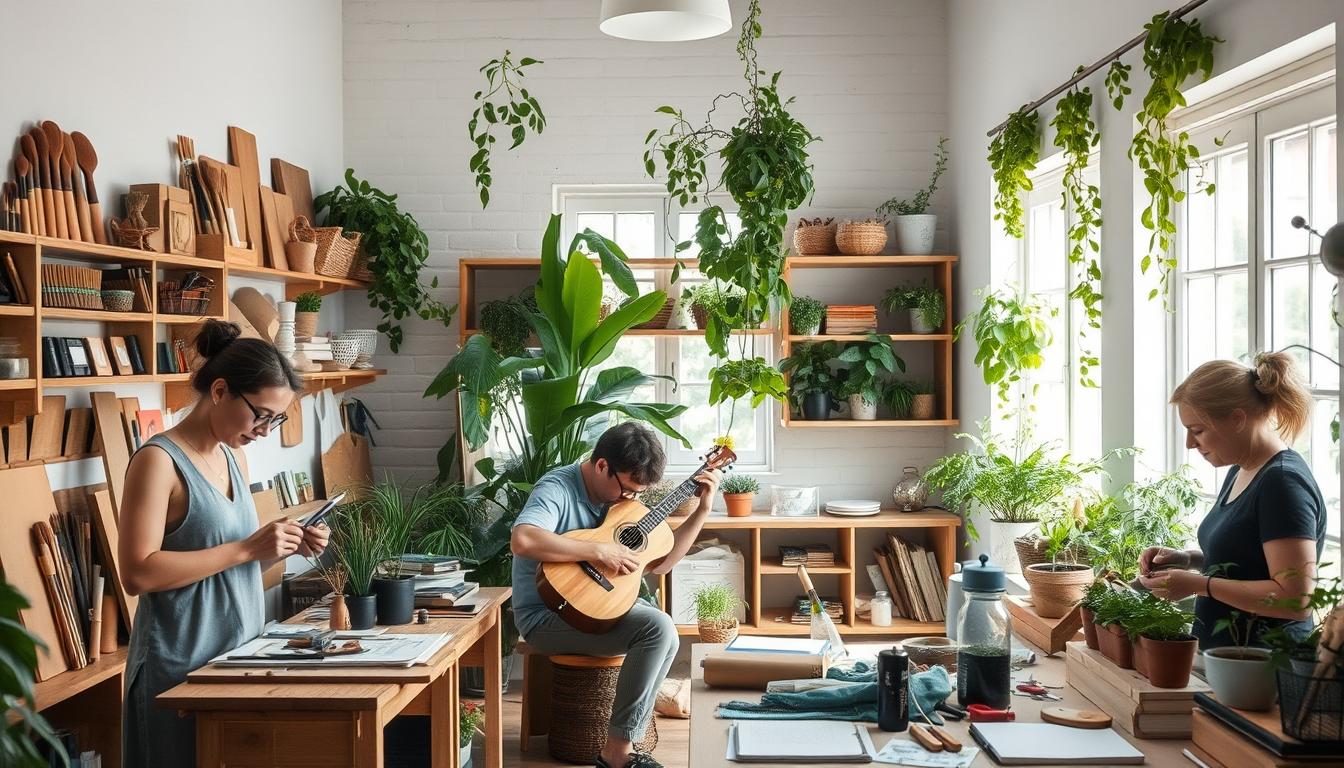I love trying new hobbies and activities. I’ve learned that going zero-waste is key. It’s not just good for the planet; it makes life better too. In this guide, I’ll share tips and eco-friendly options to help you enjoy your hobbies without harming the environment.
Whether you craft, go on outdoor adventures, bake, or garden, you can do it sustainably. By picking the right materials and upcycling, we can all help the planet. Let’s explore how to make our hobbies zero-waste!
Understanding Zero Waste Principles
I’ve recently become interested in zero waste. It’s a way of life that aims to get rid of waste and promote sustainability. This includes our hobbies and fun activities. The idea is to use a circular economy, where things are reused, recycled, or given a new purpose.
What is Zero Waste?
Zero waste is about changing how we use and throw away things. It’s a big-picture approach that tells us to use less and find new uses for items. By doing this, we can lessen our harm to the environment and help make the future better.
Why Zero Waste Matters for Hobbies
Zero waste is important for hobbies too. Many hobbies, like Eco-friendly Crafts and Waste-free Recreation, use materials. By using zero waste, we can cut down on waste, choose eco-friendly supplies, and get creative with what we have. This is good for the planet and makes our hobbies more enjoyable and mindful.
Understanding zero waste and applying it to our hobbies can help make the world a better place. It might seem hard at first, but with a bit of creativity and small changes, we can all help make the world greener.
Sustainable Crafting Solutions

Crafting lets us express our creativity and find joy in hobbies. But, traditional crafting can harm the environment. Luckily, there are many ways to craft in an eco-friendly way. Let’s look at some strategies to make your hobby greener.
Choosing Eco-Friendly Materials
When crafting, the materials you choose are key. Go for natural, renewable, and biodegradable options. Think organic fabrics, recycled paper, and sustainable wood. Stay away from plastic and choose recycled or upcycled materials instead.
Upcycling Ideas for Hobby Projects
Upcycling is a great way to reuse items you already have. Look around your home for things like old clothes, jars, bottles, and broken electronics. With some creativity, you can turn these items into unique crafts.
Tools for a Sustainable Crafting Space
Having a sustainable crafting space is important. Use eco-friendly tools and supplies. Think rechargeable batteries, refillable glue sticks, and recycled containers. Also, set up a craft area that’s organized and efficient to reduce waste and energy use.
By choosing Eco-friendly Crafts and Upcycling Projects, you can enjoy your hobbies while helping the planet. With a bit of creativity and a focus on sustainability, you can craft a greener future.
Eco-Conscious Outdoor Activities

We have a chance to enjoy Green Leisure Activities and Low-impact Leisure Pursuits. These activities not only make us happy but also help the environment. Let’s dive into eco-friendly outdoor adventures and see how they benefit us.
Low Waste Camping Tips
Camping is loved by many, but it can harm the environment. We can reduce waste by using reusable items. Bring your own utensils, plates, and cups to avoid plastic waste.
Plan your meals to avoid food waste. Dispose of trash properly. Also, use a portable stove and refillable fuel instead of disposable ones.
Nature-Based Hobbies and Their Benefits
Nature-based hobbies like birdwatching and foraging are fun and good for us. They help us appreciate nature more and feel connected to it. Activities like hiking and kayaking improve our health and reduce stress.
By enjoying these activities, we not only have fun but also help protect nature.
Whether you’re experienced or new to outdoor activities, there’s much to explore. Making eco-friendly choices helps us enjoy nature more and care for it better.
Sustainable Baking and Cooking

Cooking and baking are great hobbies that can also be good for the planet. By using Zero Waste principles, you can make your kitchen activities more eco-friendly. Let’s look at some easy ways to make your kitchen more sustainable.
Zero Waste Kitchen Staples
Having the right Zero Waste items in your kitchen is key. You’ll need reusable containers, cloth bags for produce, and refillable spice jars. These changes cut down on plastic waste and keep your kitchen tidy and waste-free.
Creative Ways to Use Leftovers
It’s a shame to let food go to waste. Luckily, there are many ways to reuse leftovers. Try making vegetable stir-fries, frittatas, or homemade stocks from scraps. You can also freeze leftovers for future, waste-free meals.
By using Zero Waste in your kitchen, cooking and baking can be better for the planet. With a few easy changes, you’ll be making tasty, waste-free dishes in no time!
Mindful Gardening Practices
I love Sustainable Hobbies and Green Leisure Activities, and gardening is my favorite. It’s a low-impact hobby that connects me with nature and helps the environment. My backyard is now a lush oasis that feeds my soul and supports local wildlife.
Composting in Your Garden
Composting is a big part of my gardening journey. I have a compost bin for kitchen scraps and yard waste. It turns waste into a natural fertilizer, reducing the need for chemicals.
Native Plants and Their Advantages
- Native plants are a key part of my garden. They love our local climate and help local wildlife like pollinators and birds.
- Native plants have made my garden a haven for butterflies, bees, and other insects. It’s amazing to see how my garden helps the environment.
Mindful gardening has become a fulfilling hobby for me. It’s eco-friendly and aligns with my values. By composting and using native plants, I’ve created a beautiful garden that’s good for the planet. I highly recommend it for anyone looking for a sustainable hobby.
Eco-Friendly DIY Projects
I love finding new ways to make eco-friendly DIY projects. Whether it’s making home decor from recycled stuff or creating gifts for loved ones, I think we can all help the planet. Upcycling and using old materials is a great way to do this.
Home Décor with Recycled Materials
One of my favorite things to do is turn old items into new home decor. Like turning jars into vases or making baskets from old fabric. It’s fun, creative, and helps reduce waste.
Practical Gifts for Friends and Family
I enjoy making gifts that are both useful and good for the planet. Upcycling old t-shirts, wine bottles, or broken jewelry lets me create special items. These gifts are not only eco-friendly but also show I care.
Doing eco-friendly DIY projects is rewarding and helps our planet. It’s a way to enjoy making things while being kind to the environment. It’s good for me and the planet!
Waste Reduction in Sports
As sports fans, we can help the environment. By using zero waste, we can make a difference. We’ll talk about choosing eco-friendly gear and joining local clean-up events.
Choosing Eco-Friendly Gear
Choosing the right gear is key for Zero Waste in sports. Look for items made from sustainable materials like organic cotton or recycled plastics. Say no to single-use plastics and use reusable items instead.
By making smart choices, we can help the planet. This supports Green Leisure Activities.
Participating in Local Clean-Up Events
- Joining community clean-up events is a great way to help the environment.
- These events clean up our outdoor spaces and raise awareness.
- Look for clean-up events hosted by local sports clubs or groups. Join them often.
- Together, we can protect the places we love for sports and activities.
By choosing eco-friendly gear and joining clean-up events, we help the Zero Waste movement. Let’s work together for a cleaner future in sports and outdoors.
Resources for Zero Waste Enthusiasts
If you love zero waste practices in your hobbies, there’s lots to help you. You can find books, blogs, and groups online. These resources will help you learn more and enjoy sustainable activities.
Books and Blogs to Explore
Zero Waste Home” by Bea Johnson is a great guide. It offers tips for living waste-free. Also, check out “Zero Waste Chef” by Anne-Marie Bonneau. It has creative, waste-free recipes and cooking tips.
Community Groups and Workshops to Join
Meeting others who care about zero waste is key. Look for groups like “Zero Waste NYC” for workshops and cleanups. You can also find classes on sustainable activities with the “Zero Waste Alliance”.

